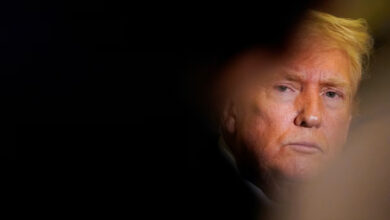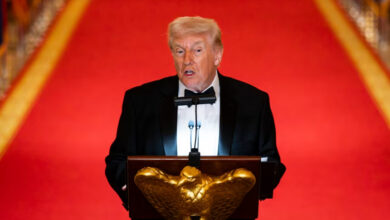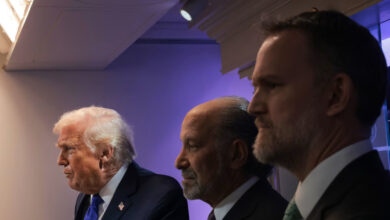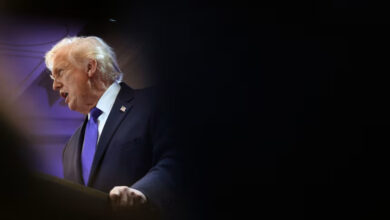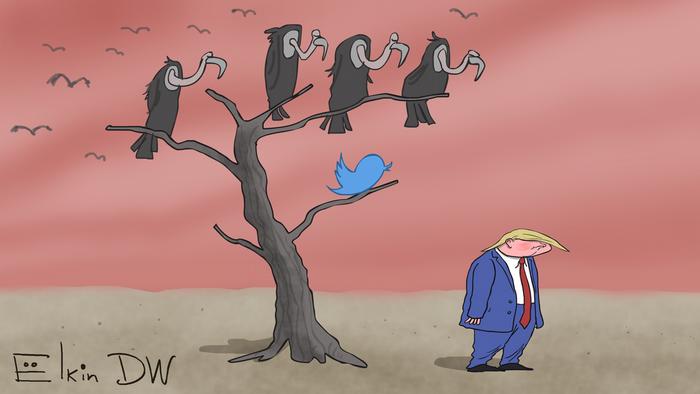
For weeks, US President Donald Trump has been maintaining that Democrats rigged the election in November and stole the vote. After he whipped his supporters into such a frenzy that some of them stormed the Capitol, Twitter temporarily suspended the account of its most infamous user for an initial period of 12 hours. Shortly afterward, it shut down Trump’s account permanently, thereby stripping the president of his primary platform.
In the course of his four years in office, Trump shared his thoughts with some 90 million Twitter followers almost daily, sometimes even hourly. The permanent suspension of his account took the world by surprise. German Chancellor Angela Merkel described the move as “problematic”and suggested that a private company should not be making decisions on curbs to freedom of expression. US legal experts, meanwhile, have pointed out that the First Amendment only limits governmental actors from curbing freedom of speech.
“The First Amendment doesn’t apply to private sector organizations. That’s not how this works,” Chris Krebs told reporters last Sunday. Krebs served as director of the Cybersecurity and Infrastructure Security Agency at the Department of Homeland Security until he was fired by Trump days after the November election for contradicting the president’s claims that the election was rigged.
Between a rock and a tough place
Pinar Yildirim is an assistant professor of marketing at the Wharton School at the University of Pennsylvania and last year co-authored a study called “Social Media and Political Contributions: The Impact of New Technology on Political Competition.”
“With regards to Merkel’s concerns, I think she also has the right to express her concerns and I can understand where she’s coming from,” she says. “I think the companies had to take action. [They couldn’t] simply sit back and let the exchange of information that is potentially creating violence be exchanged on their platform.”
But Yildirim recognizes Twitter’s quandary.
“For them this is between a rock and a tough place,” she says. “This is a difficult, challenging decision to make because they had to make the decision to give individuals the ability to express themselves. At the same time they need to make sure that the exchange of information on their platform is not creating violence on the streets, is not creating damage to individuals and property, is not creating harm to the democracy.”
And that’s exactly what Trump was doing. “Social media is the most effective tool to inform them [your base], excite them, mobilize them,” says Yildirim. “Trump has used Twitter very effectively in order to inform, sometimes to misinform, manipulate his base, to mobilize them, to make example of people he doesn’t like.”
Strengthening polarization
Other Twitters users responded to Trump’s ban from the platform with suggestions for other ways he could spread his message — with smoke signals or carrier pigeons, for example.
But as Marco Verweij points out, he can always opt for the alternative social media sites currently gaining in popularity such as Rumble or Gab, which is used by Republican Senator Ted Cruz, a loyal Trump supporter. If Trump follows suit, his influence could prove even more dangerous.
“It will only strengthen polarization,” says Verweij. “Because these forms of social media are even less regulated or not at all regulated.”
Yildirim also wonders if Trump might start communicating with his supporters via video messages. They can currently add their names to a mailing list on Donald Trump Jr.’s website, which tells them in capital letters that “Censorship is Happening” and urges them to sign up “to stay connected (…) and receive messages from Don Jr. and affiliates.”
A backlash against mainstream social media
Once Twitter began flagging more and more of Trump’s tweets and retweets to indicate they contained false, disputed or misleading info, the platform saw an exodus of users. Other social media giants are also witnessing a backlash.
In the comments below a YouTube video posted by Fox Business, a business news channel owned by the Fox News Media group, Trump acolytes vented their rage at what they see as Big Techs’ censorship.
“Fired: Amazon Prime, Twitter, Facebook. Bye!” wrote one user.
Facebook and YouTube have also banned Trump from their platforms for an indefinite period, while right-wing conservatives are angry at Amazon for suspending the so-called free speech social network Parler from its Web-hosting service in the wake of the storming of the Capitol. The platform, which has a significant user base of Trump supporters, conservatives, conspiracy theorists, and right-wing extremists, has since gone dark.
Experts warn that niche social media platforms with fewer restrictions are on the rise and are likely to contribute to a culture of growing extremism.
“In online spaces where everybody can watch and everybody can observe individuals exchanging information, we can anticipate, we can predict what might be coming up,” says Yildirim. “Now if these groups start simply segregating over multiple different platforms or creating offline alternatives or they start going underground, it’s going to be much harder to observe them, it’s going to be much harder to identify the harm or violence of these type of events that might come about.”
Verweij’s main concern is that Trump’s Twitter ban has left his supporters feeling vindicated.
“The problem is of course if people believe there is a deep state out to get Trump, and that commercial elites, Hollywood elites and journalistic elites are adamantly against Trump, and you then forbid Trump — yeah, of course, that only fortifies people’s beliefs about the deep state,” he says.
By Carla Bleiker

